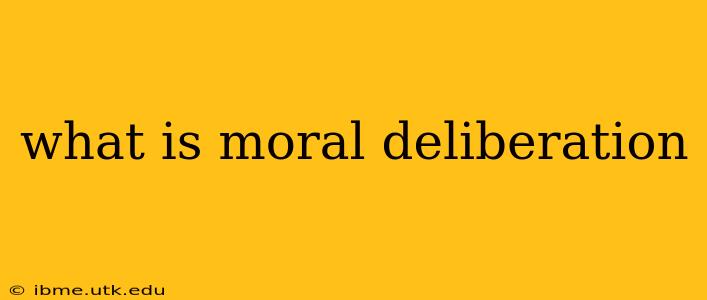Moral deliberation is the process of carefully considering and evaluating different courses of action in light of moral principles and values. It's a crucial aspect of ethical decision-making, involving a systematic approach to resolving moral dilemmas and making choices that align with one's conscience and moral framework. This process isn't simply about choosing the easiest option; it's about engaging in a thoughtful and reasoned evaluation of the potential consequences and moral implications of each potential choice.
What are the key elements of moral deliberation?
Moral deliberation is a multifaceted process encompassing several key elements:
-
Identifying the moral issue: The first step involves clearly defining the ethical dilemma. What are the competing values or principles at stake? Who are the stakeholders involved, and how are they affected by the different choices? Clearly articulating the problem is crucial for effective deliberation.
-
Gathering relevant information: This involves collecting all pertinent information related to the situation. What are the facts? What are the potential consequences of each action? Gathering sufficient information helps in making a well-informed decision.
-
Considering different perspectives: Moral deliberation necessitates exploring multiple perspectives. How would different stakeholders view the situation? What are their values and concerns? Understanding diverse viewpoints promotes empathy and a more comprehensive understanding of the ethical implications.
-
Applying moral principles and theories: This involves drawing upon ethical frameworks, such as utilitarianism (maximizing overall well-being), deontology (adhering to moral duties), virtue ethics (focusing on character traits), or care ethics (emphasizing relationships and compassion), to guide decision-making. Different theories provide different lenses through which to analyze the situation.
-
Evaluating potential consequences: Carefully weighing the potential positive and negative outcomes of each course of action is critical. What are the short-term and long-term implications? What are the risks and benefits involved? This step demands careful consideration and foresight.
-
Making a reasoned judgment: After careful consideration of all the factors, a reasoned judgment must be made. This doesn't necessarily mean there will be a single "right" answer, but rather a decision that is well-justified and ethically sound, given the circumstances and the moral framework adopted.
-
Reflecting on the decision: Even after a decision is made, moral deliberation isn't complete. Reflecting on the process, the chosen action, and its consequences is essential for learning and improving future ethical decision-making.
What are the challenges in moral deliberation?
Moral deliberation often presents significant challenges:
-
Conflicting values: Real-world dilemmas frequently involve conflicting values. For example, a decision might require balancing individual rights with the greater good. Resolving these conflicts requires careful judgment and prioritization.
-
Incomplete information: It's often impossible to have complete information about all aspects of a situation. This uncertainty can make decision-making difficult.
-
Emotional biases: Emotions can cloud judgment and impede objective deliberation. Recognizing and managing emotional biases is crucial for ethical decision-making.
-
Cognitive biases: Our thinking processes are prone to various biases that can distort our perceptions and lead to flawed judgments. Being aware of these biases is necessary to minimize their influence.
How does moral deliberation differ from other decision-making processes?
While other decision-making processes focus on efficiency, cost-benefit analysis, or personal gain, moral deliberation places a paramount emphasis on ethical considerations. It prioritizes fairness, justice, respect for persons, and adherence to moral principles above other factors. The goal is not simply to achieve a desired outcome but to make a decision that is ethically sound and justifiable.
What are some examples of moral deliberation in everyday life?
Moral deliberation is a regular feature of everyday life. Consider examples like:
-
Deciding whether to report a colleague's unethical behavior: This involves weighing loyalty to a colleague against the obligation to uphold ethical standards.
-
Choosing between two job offers, one offering higher pay but with questionable ethical practices: This requires prioritizing values such as integrity and fairness over financial gain.
-
Deciding how to respond to a friend's harmful behavior: This requires balancing compassion with the need to protect oneself and others.
Moral deliberation is a complex but essential skill that equips individuals to navigate the complexities of ethical decision-making and live a morally responsible life. It’s a process of ongoing learning and refinement, with each decision offering an opportunity for growth and greater ethical understanding.
